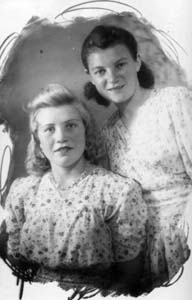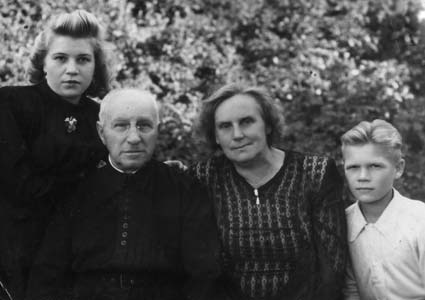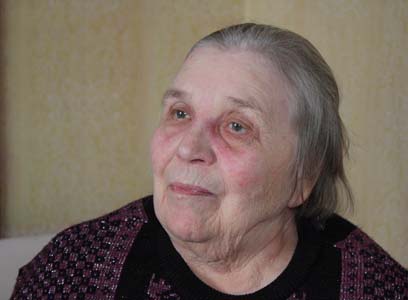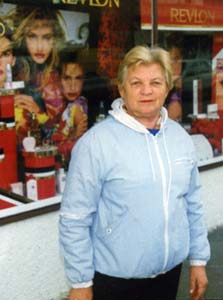

Project «Voices of Jewish settlements. Vitebsk region.»פיתוח קשרי התרבות בין העמים של ישראל ובלרוס
|
|---|
Website search |
|
MainNew publicationsContactsSite mapVitebsk regionMogilev regionMinsk regionMikhail Rivkin, Arkady Shulman
|
Mikhail Rivkin, Arkady ShulmanRELATED BY WARSeveral years ago one of the authors of this book visited the Yad Vashem Museum in Jerusalem. While looking through archives he came across the memories of Vera Leontievna Gilman. They were written in 1962, when Vera Leontievna was already living in Ramat Gan, Israel, where she is still living now. Her story is connected to events, which took place in Vitebsk during the war. The year when the war started Vera Gilman lived with her mother, brother Folia and sister Iohevet-Olga in a Jewish settlement called Kublichi. She was fourteen. Her father was a tailor while mother was taking care of the household. In April, 1937, during Stalin repressions, her father was sent to a camp, where he died. German troops appeared in Kublichi literally a few days after the war started. Immediately the place was struck with robberies and violence. All the Jews in Kublichi were ordered to register and a ghetto was established. Around 5,000 people were gathered in Lepelskaya Street. The territory was surrounded with barbed wire and guarded. There was no food supply and people soon started dying of starvation. Soon afterwards Kublichi Jews were transported to the Ushachi ghetto, which was empty after the local Jews had been executed. An inscription in Yiddish was scribbled on some houses: “We will be shot soon. If you respect yourselves and if you are lucky to survive, take vengeance for us.” Once, when Nazis were taking people to houses to set them on fire, mother said to Vera: “Run”. Vera jumped out of the window and tried to flee. She was caught together with other runaways and taken to an execution spot.  Two young friends Maria Sintsova
Two young friends Maria Sintsovaand Vera Gilman. The photo was taken in 1950. Looking at the happy faces, it is difficult to imagine what they experienced in the war. When she heard the first shots, Vera fell together with the dead people and was covered with the bodies. As soon as it got dark she got out of the pile with corpses and started crawling towards a village called Cherepovshina. Eventually she reached a house and knocked at the door. The owner, whose name was Stepan, hid her for four days. Then, fearing that the Nazis would find out, he asked her to leave. He gave her an Orthodox cross to bring her luck and said: “May God protect you”. When Vera arrived in Polotsk, she was caught and sent to prison, where she spent around three weeks. During one of the interrogations an interpreter entered the room. He seemed to be a rather powerful person. After inquiring who the girl was and finding out she had not done anything wrong he took her to an orphanage in Vitebsk. That was the start of her life in the occupied Vitebsk. Vera stayed in the orphanage until January, 1943. The orphanage was composed of about 200 children from the age of 8. “Food was really bad, - remembered Vera Gilman. – We were given 50 grams of bread and were fed twice a day. For breakfast we received water with a little flour in it, for lunch – soup with green beans or sometimes with grits, which was considered luxury. From time to time Nazis would come to the orphanage and take senior children to send them for work in Germany… Diseases were thriving: typhus, dysentery, scabies… Weaker children died in such conditions. Some kids in the orphanage teased and called Vera Gilman offensive names because she was Jewish. That scared the girl enormously, especially after she witnessed the execution of three Jewish children. They were pushed out of the orphanage and shot in the garden. A little four-year-old girl was begging: “Please, I want to live, why are you killing me?” That was why every time Germans came, Vera feared it was for her. Soon the girl started working in the kitchen, where Maria Petrovna Metsna worked as a cook. Vera told her who she was. She also told her story to Mania Sintsova. They worked in the kitchen together and were as close as sisters. When the copies of Vera Gilman’s stories were brought to Vitebsk from the Yad Vashem, we attempted to find the people she had mentioned in her stories. It took a while, but many people were aware that we were looking for the people, who saved Jews during the war. And eventually we found out that there is a woman in Vitebsk who saved a Jewish girl. Back then she was a child, too. It was not so regular for children to save other children and naturally, it attracted our attention. We called her and it turned out to be the Maria Sintsova that had been mentioned in Vera Gilman’s story. We agreed to meet. There is a photograph of Vera Gilman and Maria Sintsova in the Yad Vashem. We also had a copy and showed it to Maria Petrovna. We were truly surprised when she suddenly took a photo out of her album and handed it to us. She had the same photo. We started talking to Maria Petrovna. Her family originated from Vitebsk. There were four children - Mania and her three brothers: Peter, Volodia and Nikolai. Their father was announced missing in the war; mother died of typhus and the children were lucky to survive. They were sent to Vitebsk orphanages. That was how Mania met Vera, whose last name at that time was Kharashkevich. The orphanages were overcrowded: each room had ten to fifteen children, food was really bad. Very often they were given rotten cheese with worms. Up to these days Maria Petrovna cannot stand the sight of cheese. The orphanage was frequented by Germans. Some of them treated the children well. The interpreter, who had brought Vera to the orphanage, would come and give them candy. Another German, named Hans, would come and warn Vera and Mania when they needed to hide so that nobody would catch them and send to work in Germany. The girls then would hide in the attic or in the dark corner under the stairs. The first question we asked Maria Petrovna was if she remembered Vera well. - Of course, - she replied. – I don’t just remember – we considered each other sisters. - What did she look like? - A usual girl. She looked and sounded very Jewish. - How did she manage to survive then? - In papers she was marked as Russian and her last name was Kharashkevich, patronymic – Leontievna. She had invented both. The people, who realized she was Jewish, apparently kept the secret.  M. Sintsova, V. Zagorsky, G. Pomerantseva. 1949
M. Sintsova, V. Zagorsky, G. Pomerantseva. 1949
A linen keeper, Galina Ivanovna Pomerantseva, working in the orphanage, was a genuinely kind and decent person. She knew Vera was Jewish. She observed the girls’ close friendship and treated them as their mother. Once she found out that Germans were planning a night raid to the orphanage because they had been informed about Jewish children staying there. She warned the girls and they agreed that Vera would hide under Mania’s mattress in case they came. It would be unnoticeable on the saggy beds. As soon as they heard Germans knocking on the door, Vera quietly moved to Mania’s bed. When they entered, they started searching in all the beds and as they reached Mania, they raised her blanket, saw the Russian girl sound asleep and moved on. At the end of 1943 the Soviet Army came close to Vitebsk and the city was constantly bombed. On one of such days Galina Ivanovna Pomerantseva told Mania that they had to flee because Germans were planning to take everyone from the orphanage. After finding that out from Mania, Vera began crying and told her she could not go alone. So, Mania told Galina Ivanovna that she could not leave alone, either. The reply was: “All right, you both can come”. They left and the following day all the children were taken away from the orphanage by Nazis. That was how Vera and Mania came to Pomerantseva’s family, which was rather big. She registered the girls as her children. They helped with the housework: made firewood, cooked, did the washing and other chores. They also went to other villages to buy food when it was needed. In addition, they earned money by sweeping the streets, selling brooms, rakes and spoons at the market. They found these things in destroyed houses. The market was frequently raided by Germans. Once, when they heard the siren and saw people scattering on the city square, Mania said to Vera: - Run. Otherwise they’ll catch you and find out who you are. At first Vera refused, since she did not want to leave her friend alone, and offered to go together. However, Mania insisted on her leaving alone. Mania was caught by Nazis and later picked up by Galina Pomerantseva, who managed to convince them the girl was not a partisan. After the war Vera frequently remembered that episode and emphasized that Mania had saved her life. The house was often visited by Germans, too. Once a meticulous Germans came and, noticing the two different-looking girls, asked Galina Ivanovna:  M. Sintsova. 2009
M. Sintsova. 2009
- Are they your kids? Both? Or is this one a “Jude”? Galina Ivanovna answered that one of them was from a Russian husband and the other – from an Armenian. At the beginning of 1944 Germans began taking all Vitebsk residents to a concentration camp -the Pomerantsevs were taken, too. “Every morning, - remembered later Vera Gilman, - a few cars came to the camp. The prisoners were pushed out of the barracks and then sorted into groups: old people together with weaker women, teenagers, strong adults. Then each group was taken somewhere in a car. Little children were shot right there. I made myself a hump from a pillow; put a scarf onto my head and some soot onto my face, which made me look like an old woman. Mania also disguised herself in a similar way. We did not raise our eyes when the Nazis were sorting the people.” After the liberation by the Soviet troops, the family settled in a basement of a half-destroyed house in Steklov Street. Vera found a job in the State Bank. Soon she found her brother in March, 1945, and moved to Krivichi, Molodechno region. After finishing school she studied at a pedagogy college and became an elementary school teacher. She got married in 1952. Mania stayed with Galina Ivanovna Pomerantseva. Her brothers Kolia and Volodia had died in the war. After the war she worked as a plasterer. She was married. Galina Ivanovna worked as a teacher and her husband, Vladimir Iosifovich Zagorsky – as an accountant.  Vera Gilman, Israel. 1980 s
Vera Gilman, Israel. 1980 s
At the end of the 50s Vera Gilman, together with her husband and children moved to Poland and then Israel. Galina Ivanovna retired and moved to Perm, where her son lived. Maria Sintsova and her family stayed in Vitebsk. When she gave birth to a daughter in 1960, she was visited by Galina Ivanovna. Both of them were surprised that no letters came from Vera. Now we understand that in the 60s and the 70s correspondence with Israel was extremely problematic. At the end of the 80s Vera Gilman asked a relative of hers, who was travelling to Vitebsk, to find Maria Sintsova and give her a letter. Maria Petrovna answered immediately and the connection was re-established. “Hi, dear Manechka! I am so happy to hear about you. My dear, I am not sure about what to start from, my hand is shaking because I am so excited… I am really excited to find out about your life. We were young when we lost the connection… A lot of time has passed. Manechka, my love, write me everything about your life. I really want to know everything about you. I think of you all the time: everything you did for me – it’s impossible to forget. Unfortunately, life has separated us… I hope we’ll meet. December 17th, 1988.” They met in Vitebsk in 1989. Since then they have been keeping in touch. Unfortunately, we did not meet Galina Ivanovna Pomerantseva and her husband Vladimir Iosifovich Zagorsky – the people who saved the two lives in the war. They did not live to the time when they were honorably instated “the Righteous among the Nations”. |
|||
|
|
Jewish settlements in Vitebsk regionVitebsk • Albrehtovo • Babinovichi • Baran • Bayevo • Begoml • Beshenkovichi • Bocheikovo • Bogushevsk • Borkovichi • Braslav • Bychiha • Chashniki • Disna • Dobromysli • Dokshitsy • Druya • Dubrovno • Glubokoye • Gorodok • Kamen • Kohanovo • Kolyshki • Kopys • Krasnopolie • Kublichi • Lepel • Liady • Liozno • Lukoml • Luzhki • Lyntupy • Miory • Obol • Oboltsy • Orsha • Osintorf • Ostrovno • Parafianovo • Plissa • Polotsk • Prozorki • Senno • Sharkovshina • Shumilino • Sirotino • Slaveni• Smolyany • Surazh • Tolochin • Ulla • Verhnedvinsk • Vidzy • Volyntsy • Yanovichi • Yezerishe • Zhary • Ziabki • |
Main |
New publications |
Contacts |
Site map |
Vitebsk region |
Mogilev region |
Minsk region |